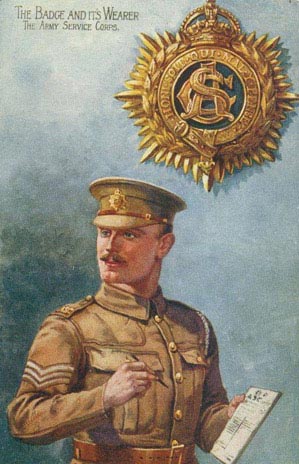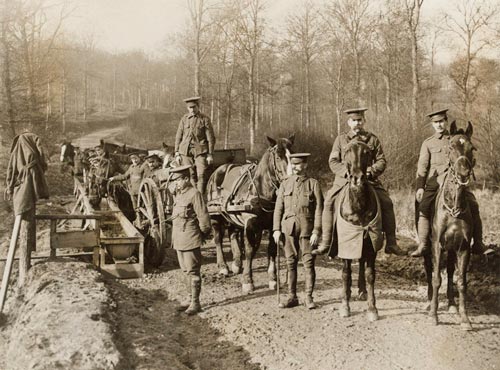Private
 |
Army Service Corps
Badge and Wearer. |
Thomas Charles Harwood
Service Number:
5847
203850
Regiment & Unit/Battalion
Army Service Corps [age 32]
Worcestershire Regiment [age39]
4/8th Battalion
Date of Death
1950
Buried or commemorated at
Broadwas Roll of Honour.
Country of Service
United Kingdom
Additional Info
Son of Mr. and Mrs. Thomas Harwood
Family history
Thomas and Harriet Harwood married and their son was Thomas Charles Harwood, born 26th July 1880, at Broadwas.
Thomas Charles Harwood, married, Doris Lily Goodyear, on the 15th April 1915, White Ladies Aston, Worcestershire.
Thomas
joined the forces in 1916 Army Service Corps, Service No. 5847, and in 1919, 4/8th Battalion,
Worcestershire Regiment, Service No. 203850
[They lived at the steps, Broadwas]
1939 Register
Thomas Charles Harwood - b. 26 Juyl 1880 - Occupation,Farm Labourer [Married]
Doris Lily Harwood - b. 12 December 1894 - Occupation, Unpaid Domestic Duties [Married]
Winifred Ellen Harwood - b 12 July 1916 - Occupation, Mail Order Clerk [Single]
Ivy E. Harwood - b. 02 June 1922 - Occupation, Domestic Duties [Single]
Cecil R. Harwood - b. 15 May 1926 At School [Single]
Two other records living here were officially closed.
Address: Hardimass, Boadwas, Worcestershire.
The British and Imperial forces on the Western Front required a vast amount of ammunition, food and equipment.
By November 1918 they needed a monthly issue of 67 million pounds (lbs) of meat, 90 million pounds of bread,
32 million pounds of forage and 13 million pounds of petrol. The Army Service Corps, assisted by thousands of Chinese,
African and Arab labourers, was responsible for moving this material from the Channel ports where it was collected in
base depots. From there it was moved by train to a regulating station from where it was entrained to either a railhead
or advanced supply depot. At this point supplies would be moved by horse or motor transport to the quartermaster
staff of front line units.

Army Service Corps c.1916
The officers and men of the ASC – sometimes referred to in a joking, disparaging way as Ally Sloper's Cavalry,
were the unsung heroes of the British Army in the Great War. Soldiers can not fight without food, equipment and
ammunition. They can not move without horses or vehicles. It was the ASC's job to provide them. In the Great War,
the vast majority of the supply, maintaining a vast army on many fronts, was supplied from Britain. Using horsed
and motor vehicles, railways and waterways, the ASC performed prodigious feats of logistics and were one of the
great strengths of organisation by which the war was won.
At peak, the ASC numbered an incredible 10,547 officers and 315,334 men.
Note that the ASC is the same as the RASC: it received the Royal prefix in late 1918.
Return
©peh



